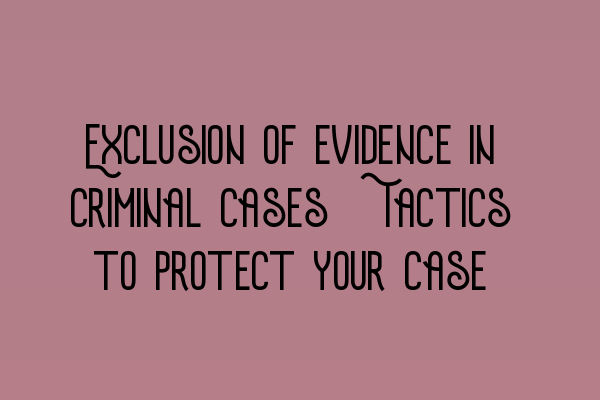Exclusion of Evidence in Criminal Cases: Tactics to Protect Your Case
As a criminal solicitor, protecting your client’s rights and building a strong defense strategy is crucial. One important tactic that can significantly impact the outcome of a case is the exclusion of evidence. When certain pieces of evidence are deemed inadmissible, it can weaken the prosecution’s case and increase the chances of a favorable outcome for your client. In this article, we will explore some tactics that can be employed to exclude evidence in criminal cases.
1. Challenging Probable Cause
Probable cause is the legal standard required for law enforcement to make an arrest, conduct a search, or seize evidence. As a solicitor, you can challenge the validity of probable cause by demonstrating that it was lacking or improperly obtained. By questioning the legality and validity of the initial steps taken by law enforcement, you can lay the foundation for excluding evidence that stems from an illegal search or seizure.
2. Establishing Chain of Custody Issues
For evidence to be admissible in court, it must be properly handled and preserved to maintain its integrity. Any breaks in the chain of custody can cast doubt on the reliability and authenticity of the evidence. As a savvy solicitor, you can investigate the handling of the evidence, including how it was collected, stored, and transported. If any irregularities or mishandling can be identified, it can be argued that the evidence should be excluded due to chain of custody issues.
3. Challenging Expert Witness Testimony
Expert witnesses often play a crucial role in presenting complex scientific or technical evidence in criminal cases. However, their testimony can be challenged if it lacks credibility or is based on flawed methodologies. By thoroughly reviewing the expert’s qualifications, the methodologies employed, and the reliability of their conclusions, you can seek to exclude their testimony or limit its impact on the case.
4. Asserting Privilege or Confidentiality
In certain situations, privileged or confidential information may be subject to disclosure. However, as a diligent solicitor, you can assert applicable privileges or the confidentiality of certain communications or materials. By demonstrating that the evidence in question falls within a legally recognized privilege, such as attorney-client privilege or doctor-patient confidentiality, you can argue for its exclusion.
5. Challenging the Admissibility of Statements
Statements made by the defendant or witnesses can be crucial evidence in a criminal case. However, their admissibility can be challenged based on a variety of factors. For instance, if a statement was obtained through coercion, duress, or in violation of the defendant’s right to remain silent, it may be deemed inadmissible. By thoroughly reviewing the circumstances surrounding the statements, you can challenge their admissibility and seek their exclusion.
Excluding evidence can be a powerful strategy in criminal cases, but it requires a deep understanding of the law and effective execution. As an experienced solicitor, you need to stay up to date with the latest legal developments and constantly refine your knowledge and skills. If you are preparing for the SQE exams, make sure to check out our SQE 1 Practice Exam Questions and SQE 1 Practice Mocks FLK1 FLK2 for comprehensive exam preparation.
Additionally, our SQE 2 Preparation Courses and SQE 1 Preparation Courses can help you develop the necessary skills and knowledge to excel in your legal career. Stay updated with important dates and information regarding the SRA SQE exams by referring to our SRA SQE Exam Dates.
In conclusion, excluding evidence in criminal cases requires a strategic approach and a solid understanding of the law. By employing tactics such as challenging probable cause, establishing chain of custody issues, challenging expert witness testimony, asserting privilege or confidentiality, and challenging the admissibility of statements, you can safeguard your client’s interests and increase the likelihood of a favorable outcome.
